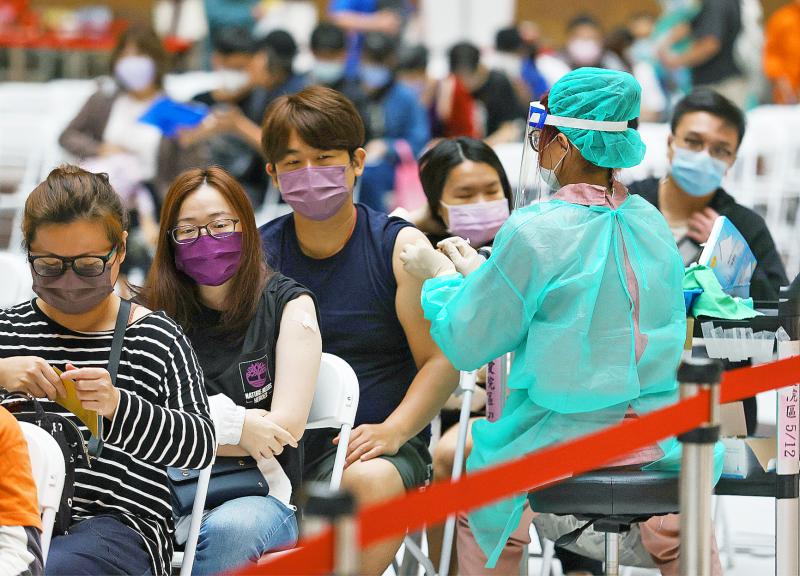Taiwan’s worst COVID-19 outbreak has left the nation’s insurers bracing for more than US$1 billion in claims that the financial regulator is urging them to honor.
Financial Supervisory Commission Chairman Thomas Huang (黃天牧) has ordered insurers to pay out on valid COVID-19-related insurance policies after they faced criticism from lawmakers for dismissing claims, canceling policies and delaying payouts.
Insurers are looking to limit their losses on policies after underestimating the extent of the disease.

Photo: CNA
There are more than 6.3 million still active COVID-19-related policies and another million waiting for approval, the commission said.
As of Monday last week, insurers had paid out more to customers — NT$2.58 billion (US$87.9 million) — than the NT$2.12 billion in revenue they have received from premiums, the Insurance Bureau’s tallies showed.
With only about 2 percent of policies subject to claims so far and the outbreak showing no sign of abating, insurers are facing a wave of further claims next month and in July.
Speaking to lawmakers on Monday last week, Huang said that payouts would likely be higher than the NT$41 billion estimate mentioned by lawmakers.
While that is just a tiny fraction of the NT$2 trillion in net assets held by the local insurance industry, the majority of those are held by the large life insurers.
The potential claims represent about 25 percent of the assets held by property insurance companies, which were among the most active in selling COVID-19 policies.
Property insurers, which focus primarily on vehicle protection, have struggled to find growth in recent years and saw COVID-19 as a great opportunity, Taiwan Ratings Corp (中華信評) director Andy Chang (張書評) said.
When working out their risk models, many miscalculated the potential number of cases by a factor of nearly 100. They also failed to adequately estimate the necessary capital buffer.
“They shouldn’t have just said: ‘How much are our competitors selling? We want to sell that much too,’” Chang said by telephone.
Even the largest local insurers are likely to take a hit.
Claims at Fubon Life Insurance Co (富邦人壽) and Cathay Life Insurance Co (國泰人壽) could reach NT$5 billion, equivalent to about 2 percent of their net income this year, Bloomberg Intelligence analyst Steven Lam wrote in a note on May 13.
The generosity of the policies that insurers sold is a major part of the problem. Since the beginning of the COVID-19 pandemic, many companies have offered policies protecting customers against negative health impacts of COVID-19 and the associated costs.
Quarantine insurance is among the most popular. For as little as NT$666 a year, the insurers guaranteed to pay out NT$50,000 if the customer was required by the government to isolate. If the client later tested positive for COVID-19, they could get another NT$50,000.
The Life Insurance Association’s (壽險公會) statistics showed that the local insurance industry reported total premiums of NT$733.33 billion in the first four months of this year, a decrease of 20.6 percent from the same period last year, of which the first-year premiums decreased by 15.3 percent year-on-year.
The Taiwan Insurance Institute (保發中心) estimated that the industry might see total premiums decline by 18 percent this year due to a substantial drop in premiums of investment-linked insurance policies, the Chinese-language Liberty Times (sister paper of the Taipei Times) reported yesterday.
Additional reporting by staff writer

Taiwan would remain in the same international network for carrying out cross-border payments and would not be marginalized on the world stage, despite jostling among international powers, central bank Governor Yang Chin-long (楊金龍) said yesterday. Yang made the remarks during a speech at an annual event organized by Financial Information Service Co (財金資訊), which oversees Taiwan’s banking, payment and settlement systems. “The US dollar will remain the world’s major cross-border payment tool, given its high liquidity, legality and safe-haven status,” Yang said. Russia is pushing for a new cross-border payment system and highlighted the issue during a BRICS summit in October. The existing system

Taiwan Semiconductor Manufacturing Co (TSMC, 台積電) is expected to grow its revenue by about 25 percent to a new record high next year, driven by robust demand for advanced technologies used in artificial intelligence (AI) applications and crypto mining, International Data Corp (IDC) said yesterday. That would see TSMC secure a 67 percent share of the world’s foundry market next year, from 64 percent this year, IDC senior semiconductor research manager Galen Zeng (曾冠瑋) predicted. In the broader foundry definition, TSMC would see its market share rise to 36 percent next year from 33 percent this year, he said. To address concerns

Intel Corp chief financial officer Dave Zinsner said that a formal separation of the company’s factory and product development divisions is an open question that would be decided by the chipmaker’s next leader. Zinsner, who is serving as interim co-CEO following this month’s ouster of Pat Gelsinger, made the remarks on Thursday at the Barclays technology conference in San Francisco alongside co-CEO Michelle Johnston Holthaus. Intel’s struggles to keep pace with rivals — along with its deteriorating financial condition — have spurred speculation that the next CEO would make dramatic changes. That has included talk of a split of the company’s manufacturing

PROTECTIONISM: The tariffs would go into effect on Jan. 1 and are meant to protect the US’ clean energy sector from unfair Chinese practices, the US trade chief said US President Joe Biden’s administration plans to raise tariffs on solar wafers, polysilicon and some tungsten products from China to protect US clean energy businesses. The notice from the Office of US Trade Representative (USTR) said tariffs on Chinese-made solar wafers and polysilicon would rise to 50 percent from 25 percent and duties on certain tungsten products would increase from zero to 25 percent, effective on Jan. 1, following a review of Chinese trade practices under Section 301 of the US Trade Act of 1974. The decision followed a public comment period after the USTR said in September that it was considering